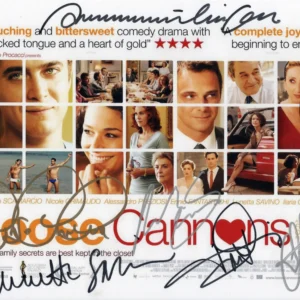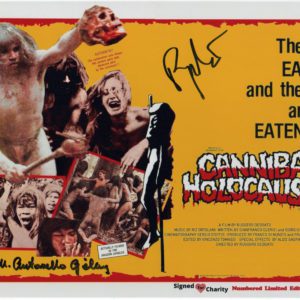Description
EARLY CAREER:
ASSISTANT DIRECTOR
After this contract to make historical documentaries finished, Hill worked for a time in the mail room at Universal (“Somebody told me that was a good way to meet people”). He then got into the training program of the Directors Guild of America, which enabled him to work in television as an apprentice. He observed and worked for over a year on such shows as Gunsmoke, Wild Wild West, Bonanza and Warning Shot. “I did a lot of shows for a couple of weeks, they would rotate you through,” he says. Hill wound up as second assistant director on The Thomas Crown Affair in 1968. He then went on to work as the uncredited second assistant director on Bullitt—”It was my job to set background and also to set it up with the police. We had to organise every shot so people wouldn’t wander out into the middle of the street and be hit… Every time we did a shot I was scared to death.”In 1969, he was the second assistant director on a Woody Allen film, Take the Money and Run, but said he remembers doing very little except passing out the call sheets and filling out time cards. He also worked as a first assistant director on some television advertisement. “I didn’t have a shred of desire in those areas,” says Hill of assistant directing. “I wanted to work and be around films. I certainly took my duties fairly seriously and all that. I didn’t see it as a long term kind of commitment.”
SCREENWRITER
During this time Hill was writing screenplays at night and on the weekend.
“I began to read screenplays that were being made, and I hesitate to say this, but I guess I read them and said: ‘Christ, I could do that.'” It took him “four to five years to write my first screenplay writing at night, while I still had another day job.”He says one of his earlier works “was intensely personal about a love affair I had. It was terrible, I knew it. It was not until he started writing in a more “structured narrative environment” that he “began to find my voice… I had a hard time finishing scripts. My problem was finding certain character narrative concerns. Once I finished scripts, I almost instantly made a living. Not only made a living, but got them made. From the time I finished them to the time they were getting made, making progress on the trail, that all happened pretty quickly. Hill later said, “I was very sympathetic and identified with the New Hollywood.” But his films “are, or were, rather retro. That is to say, I didn’t tackle subjects. I wanted to do genre films.”
Hickey and Boggs
Hill’s first completed screenplay, a Western called Lloyd Williams and His Brother, was optioned by Joe Wizan. It was never made but the script was admired at Warner Bros who asked Hill to pitch some projects. He came up with a detective story, Hickey & Boggs and the studio agreed to finance a draft. “Detective films were very old hat, not the kind of thing a young screenwriter was going to pitch,” recalls Hill. “I think they were intrigued, maybe fresh air could be blown into a venerable genre.” Warners liked the Hickey & Boggs script and hired Hill to rewrite the script for The Thief Who Came to Dinner, for which he ended up getting sole credit. Hickey & Boggs was later sold to United Artists and rewritten by director Robert Culp. Hill said he felt the film “had some nice moments, but it was cast much differently than it was written. I wasn’t too excited about it.”
The Getaway
Meanwhile, Peter Bogdanovich’s ex-wife Polly Platt, a film editor, had read Hill’s script for Hickey & Boggs and recommended him to co-write The Getaway, which Bogdanovich was going to make with Steve McQueen. Bogdanovich and Hill worked on the script together in San Francisco while Bogdanovich was directing What’s Up, Doc? Hill says that Bogdanovich was interested in making the film a more Hitchcock-type film. They had completed 25 pages when they went back to L.A., whereupon McQueen fired Bogdanovich without reading any of their work. Sam Peckinpah came on to direct; Hill started from scratch and wrote his own script in six weeks. The resulting film was a big hit which Hill later described “of the films I wrote, I thought it was far and away the best one, and most interesting.” He said the success of the film “was really how I got to be a director; the fact it had done so well put me in line to get a shot.” Hill and Peckinpah got along well and for a time it seemed Peckinpah might direct Lloyd Williams but he decided to make Pat Garrett and Billy the Kid instead. The Thief Who Came to Dinner eventually came out. Walter Hill later said “Warren Oates was very good in the movie—better than the movie was. They cut a lot of things out of the movie they shouldn’t have.”
Two with Paul Newman
Hill went on to write a pair of Paul Newman films, The Mackintosh Man and The Drowning Pool. By Hill’s own admission, his work on The Mackintosh Man “wasn’t much” and he did it to settle a lawsuit with Warner Bros, with whom he was angry for selling Hickey & Boggs—Warners offered to settle the suit if Hill wrote them a screenplay, giving him the chance to adapt his choice of several novels that the studio owned the film rights to. He picked The Freedom Trap, by Desmond Bagley. “I wrote a quick script which I was not particularly enamored with myself,” Hill said. However it attracted the interest of Paul Newman and John Huston. “One would like to think you are mistaken about the wonders of your work, but I didn’t believe it,” he said. “That part turned out to be true. I went over to work on the script with Huston. He wasn’t very well, I ended up with sole screen credit, but one of the problems is the screen credit is misleading very often. I wrote 90% of the first half, various people wrote the rest. I didn’t think it was a very good film. Hill says he never saw the final product, but was told it was “a real bomb”. Producers Larry Turman and David Foster asked Hill to adapt Ross Macdonald’s novel The Drowning Pool for Robert Mulligan to direct as a sequel to a previous Newman film, Harper (1965). The producers did not like the direction Hill took with his script—he later estimated only two scenes in the final film were his—so he left the project to write Hard Times for Larry Gordon at Columbia Pictures.
Alien
In the early years of his career, Hill set up his own production company, Brandywine Productions, to develop and produce films. A script came to him, Alien, which he optioned and rewrote with his partner, David Giler. Hill and Giler were not credited for their writing work. Hill decided not to direct the film, which became a massive hit. John Hughes later recalled, “I had been writing scripts for quite a while, but I never really knew what screenwriting was about until I read the script Walter wrote for Alien.”
FILM DIRECTOR
Hard Times
By the early 1970s, Hill wanted to direct. “I think in casual conversation I would have told anybody I wanted to direct. At the same time I knew Hollywood was a closed off place… It was much harder to get in. To be an older director was a very positive thing. It meant you had survived, knew your way, could make things and make them meet your economic responsibilities. It was always paramount in studio minds, especially in those days… If I was going to direct I was going to write my way in. No TV, no play, I was simply somebody who said I have a sensibility, I think I can do this, based on nothing other than my scripts basically.” Hill met producer Lawrence Gordon in 1973. He agreed to let Hill direct a film if he wrote a screenplay for him. Hill made a deal to write and direct for scale and in turn got a shot at directing. The result was Hill’s 1975 breakthrough film, Hard Times, made on location in New Orleans for just $2.7 million in 38 days. James Coburn played a fast-talking promoter of illegal street fights in 1930s New Orleans and Charles Bronson played the boxer protagonist. The film was also a turning point for Hill as a screenwriter. He read Alexander Jacobs’ screenplay for the John Boorman film Point Blank and considered it a “revelation” in terms of style and format. He decided to tailor his own scripts in that manner, as he described it, “extremely spare, almost Haiku style. Both stage directions and dialogue.” He was also influenced by Sam Peckinpah. Hill wrote Hard Times, The Driver, The Warriors, and an uncredited rewrite of Alien in this style. Following the movie Hill was approached to direct The Shootist with John Wayne but turned it down as he disliked the script. He created the TV series Dog and Cat which premiered in 1977 starring a young Kim Basinger as a police officer. It was not a ratings success and was soon cancelled. However Hill’s pilot script later influenced Shane Black’s original script for Lethal Weapon.
The Driver
Hill’s second film as a director was The Driver starring Ryan O’Neal as a laconic getaway driver for hire and Bruce Dern as a driven cop pursuing him. No character in the film has a name; they are merely The Driver, The Detective, and so forth. Hill originally had wanted to cast Steve McQueen, but he turned down the role because he did not want to do another car film. “This Walter Hill is a force to be reckoned with,” said O’Neal, “a first rate writer and an even better director. And he’s fast. Most young directors today think they are David Lean.” The Driver was financed by EMI Films who announced they would make a second film with Hill, a Western he wrote with Roger Spottiswoode, The Last Gun. However The Driver was a commercial failure in the United States. “To say it did not do well would be kind,” said Hill. “Had I not been shooting The Warriors at the time, I don’t think my career would have survived. They loved it overseas, but in those days, that didn’t matter that much. It made exactly zero dollars in the United States. I remember the studio had this huge sheaf of Xeroxed reviews they’d handed me — you could stop a fucking .45 slug with this stack, it was so thick. And of all the reviews in this six-inch thick pile, there was only one good one.” (In 2016 Hill would say that “whenever they show retrospectives of my stuff, it’s usually the first thing they show. Sometimes you just have to wait it out.”)
The Warriors
Hill was going to make The Last Gun with Larry Gordon but when the financing on the project failed to materialize, Gordon showed Hill a copy of the novel The Warriors by Sol Yurick. They took it to Paramount Pictures because they were interested in youth films at the time and succeeded in getting the project financed. Hill remembers “it came together very quickly. Larry had a special relationship with Paramount and we promised to make the movie very cheaply, which we did. So it came together within a matter of weeks.” When The Warriors was released there were a series of shootings and killings at screenings involving filmgoers on their way to or from showings. This prompted Paramount to remove advertisements from radio and television completely and display ads in the press were reduced to the film’s title. However the film was very popular and received excellent reviews. “Hollywood forgives a lot when you have a hit,” said Hill. “I don’t know what to say about it, other than the fact that it was just a gift in terms of getting it. The studio hated it, and didn’t even want to release it. There was a lot of friction with management at the time. Some of it might have been my fault.”
The Long Riders
James Keach had developed a script about the Jesse James Gang, The Long Riders, which United Artists were willing to finance if a suitable director were to be found. Hill was approached and eagerly agreed to film his first Western. The film is remembered for casting real-life acting brothers (the Keaches, Carradines, Quaids and Guests) as historical outlaw siblings (the James, Younger, Miller and Ford brothers). Hill later said his “code” for the film was to keep “the jokes funny and the bullets real. It is about moral choices. I think people who object to violence shouldn’t go to the movies…. The use of all the brothers can be perceived as a gimmick but I wanted a family feeling to the movie.”
Southern Comfort
Hill’s next film was going to be adaptations of The Last Good Kiss (by James Crumley) and then Red Harvest (by Dashiel Hammett).However neither were made. Instead Hill did Southern Comfort, originally written in 1976. It was an intense Deliverance-style thriller about a group of U.S. Army National Guardsmen (including Keith Carradine, Powers Boothe and Fred Ward) on weekend maneuvers in the Louisiana bayou who find themselves fighting for survival in the swamps after offending some local Cajuns. The film was seen by many as an allegory for America’s involvement in the Vietnam War, although Hill denies this is the case. He and David Giler rewrote the script prepared by another writer. According to Hill, “No studio wanted to make it, but an independent guy showed up who had a relationship with Fox. Liked it, said he would finance it.” The film was critically acclaimed but, in Hill’s words, it “didn’t make a… nickel anywhere. Foreign, domestic, anything… I was proud of the film… But I was disappointed in the lack of response. It was a universal audience failure… Usually you can say they loved it in Japan or something. I don’t think anybody loved it anywhere.” Hill tried to make Lone Star, from the play by James McClure to star Powers Boothe and Sigourney Weaver (1981). Like Red Harvest and The Last Kiss it was not made though the story of Last Man Standing (which he made in 1996) was very close to Red Harvest.
48 Hrs.
Larry Gross later recalled meeting Hill in the early 1980s: “He’d had some success, but then he had a series of setbacks. And there was also the scandal around The Warriors; any success had been eclipsed by the killings in the theaters. So there was that, as well as the noncommercial success of Southern Comfort and Long Riders and the fact that there was a writer’s strike. All of that meant that Walter hadn’t worked in a while. Meaning a year or so. And what happened was the strike ended and the studios didn’t have a lot of ready scripts. So this clever colleague, Larry Gordon, dusted off a script that had been shuttling around development and got it greenlit at Paramount with his friend Michael Eisner. And that script was 48 Hrs..” 48 Hrs. was originally meant to star Clint Eastwood and Richard Pryor but both dropped out. Nick Nolte became attached as star and Hill’s then-girlfriend, a talent agent at ICM, recommended the role of the convict be played by an exciting new comic on Saturday Night Live, Eddie Murphy. The resulting film was a problematic shoot, with many clashes between Paramount and Hill, but it resulted in a massive box office success.
Streets of Fire
Hill’s box office success with 48 Hrs. enabled him to raise the money for a stylish “rock ‘n’ roll fable”, Streets of Fire. He almost set this up at Paramount but they changed their mind; Universal decided to finance instead. While initially a box office failure, it gained a greater following in subsequent years (as many of Hill’s films have). Hill was meant to follow it up with a big screen adaptation of Dick Tracy, replacing John Landis. Hill worked on Dick Tracy for several drafts of the script and screenwriter Jack Epps Jr. says he “played a big role in reducing and focusing the screenplay”. Hill intended to make the film directly after Streets of Fire but eventually left the project after a dispute over budget with Universal and with star Warren Beatty; the project would be made several years later with Beatty directing.
Brewster’s Millions
Hill’s success directing Eddie Murphy in 48 Hrs. saw him receive an offer to work with Richard Pryor in a new version of Brewster’s Millions (1985). This was Hill’s first—and, as of 2016, only—full-fledged comedy. He says he purposefully made the film “to improve his bank account and success quotient”, and admitted it was “an aberration in the career line”. He added that “whatever [the film’s] deficiencies, I think the wistful quality was there. I was happy about that. The picture did well and made money.” After making Brewster’s Millions Hill said he had another comedy in development at Universal. He also wanted to do a new version of The Magnificent Seven (1960) which he had written with Lukas Heller, “quite a bit different from the original—it’s more Hawksian in flavour.” The plot had a female doctor hire seven mercenaries to defend an intellectually disabled boy from a lynching.
Crossroads, Blue City and Aliens
Hill followed Brewster’s Millions with Crossroads (1986), a music-themed drama from an original script by John Fusco inspired by the life and music of Robert Johnson. The score was done by Ry Cooder, who had been Hill’s most regular composer since The Long Riders. The film performed poorly at the box office, despite the presence of Ralph Macchio in the lead. He also co-wrote (with Lukas Heller) and executive produced Blue City (1986) from a 1947 novel by Ross Macdonald. Hill developed this project intended to star a leading man in his mid-30s but by the mid-1980s a number of popular young male actors had emerged, so the script was rewritten to accommodate one of them (Judd Nelson). Hill handed over directing duties to Michelle Manning, who made her debut as director. The film was a critical and commercial disaster. However, that year also saw the release of Aliens (1986), a sequel to Alien. Hill says he and Giler decided “the next one should be a straight action thriller -the military takes over- a patrol movie.” They hired James Cameron to make the film and worked on his original treatment “a bit”. Hill had a story and executive producer credit on the film which was a massive hit.
Extreme Prejudice
In 1987, he returned to hard-edged action with Extreme Prejudice, a contemporary Western for Carolco Pictures about the War on Drugs based on a story by John Milius and Fred Rexer, which had been originally written in the mid-1970s. It reunited Hill with Nick Nolte. The film was a financial failure. Hill said he “tipped my hat to Sam [Peckinpah] a couple of times” in the film and “I don’t think it was understood how much genre parodying was involved in that picture. It rather mystified a lot of American critics but it has its defenders.”
Red Heat
Hill returned to the buddy-cop genre with Red Heat (1988), a sort of Glasnost-era reworking of 48 Hrs. with Arnold Schwarzenegger as a stoic Soviet cop who travels to Chicago to catch a Russian drug-dealer (Ed O’Ross). Schwarzenegger is partnered with a wisecracking American cop (Jim Belushi), who is as laid-back and mouthy as his Soviet counterpart is taciturn and humorless. Hill directed and rewrote Troy Kennedy Martin’s script. The film, whilst profitable, was considered to be a box office disappointment compared to other Schwarzenegger films of the era.Around this time, Hill was mentioned as wanting to make an adaptation of Jim Thompson’s Pop. 1280 but it was never made.[39] A project that was filmed was the horror anthology television series Tales from the Crypt (1989–96), on which Hill worked as an executive producer, as well as directing a number of episodes.
Johnny Handsome
Hill ended the 1980s with Johnny Handsome (1989) starring Mickey Rourke. It was based on a 1972 novel by Morton Freedgood, about a criminal who has plastic surgery and seeks revenge on his colleagues who betrayed him. The project had been developed for a number of years—Hill says he turned down the job four times before deciding to do it when Harold Becker dropped out as director. The film was a flop at the box office. Hill had a number of projects in the late 1980s that were never made. These included American Iron (1989/1990), a film set in the world of bikers written by Hill, Mark Brunet, Daniel Pyne, and John Mankiewicz. He also did a draft (with David Giler) of an adaptation of the Jim Harrison novella, Revenge—this was not used when turned into a film in 1990.
Another 48 Hrs.
Hill began the 1990s with the only sequel he has directed to date, Another 48 Hrs., with Murphy this time top-billed over Nolte. The sequel to his biggest commercial success was thought by many critics to be merely a retread of the original, but became the highest-grossing film that Hill has directed. The film grossed more at the US box office than its predecessor and made $72.7 million from foreign markets for a total of $153.5 million. In 1991 he came close to directing a big screen version of the television series The Fugitive (1963-1967) with Alec Baldwin, but Baldwin was not considered a big enough star. The film The Fugitive (1993) was released two years later, starring Harrison Ford and without Hill’s involvement. The director’s credit went instead to Andrew Davis.
LATER FILMS:
Trespass and Alien 3
In 1992, Hill directed a film originally called Looters about two firemen who cross paths with criminals while searching for stolen loot in an abandoned East St. Louis, Illinois tenement building. However, the 1992 Los Angeles riots broke out shortly before the film’s release and the studio delayed its opening, eventually changing the title to Trespass. Following this, he and David Giler wrote a remake of The Killer and plans were announced to make it with Richard Gere and Denzel Washington. However the film did not proceed. He and Giler also wrote the final script for Alien 3, as well as co-producing it.In 1993, Hill changed his agent.
Geronimo and Wild Bill
Hill planned to direct Alec Baldwin in a new version of The Getaway based on Hill’s original script. Then there was a dispute over the budget and Hill left the project in order to make Geronimo: An American Legend. The film was well received by the critics, but fared poorly at the box office. This also happened to The Getaway (1994), which ended up being directed by Roger Donaldson from Hill’s script. In 1994, Hill and his wife, agent Hildy Gottlieb, signed a two-year non-exclusive deal with Paramount. They developed a film, Sudden Country, an action adventure in the vein of Treasure Island set in late-19th century Texas to star Elijah Wood, based on a novel by Loren Estleman.
The film was not made. Instead Hill wrote and directed a second biopic, Wild Bill (1995). This too had little critical or commercial success. Hill reflected on his career in 1995: “I think every director thinks that he hasn’t been allowed to make the films he wanted to make. I certainly haven’t been able to make as many Westerns as I’ve wanted. (But) sometimes staying alive in a career sense is very important, and you think, ‘Maybe I’ll do this, which will do well and allow me to do that.’ It’s very easy to miscalculate. It’s a dangerous game. But I think in the end, none of us have anybody to blame except ourselves. It can be very hard. The kinds of things that directors most want to do are usually not things the studio perceives to be commercially viable. It really is that simple. Is that true of me? Sure. Absolutely. But it’s no more true of me than 50 other people I know.” Hill admitted his style of films were becoming less fashionable: “I admire a lot of what’s going on out there, but the oversize kind of cartoon action movies is not something I’m terribly comfortable with. I think what I do is much more in the tradition that the bullets are real and they’ll knock you down. I used to really get criticized for my lack of realism, but now I think my films are perceived to be vastly more realistic than most of the action movies that are happening out there… I think one of the things about being a director is, you should always try to re-create within yourself the kind of emotions you had watching film when you were very young. The kind of action movies that I always liked, the kind of comic books I always liked, were the serious ones. The characters were very realistic within the framework of the drama, and that kind of action movie interests me a lot more than the super-heroes. And so in that sense, maybe I’m slightly out of step, I suppose, but so be it.” Hill continued as one of the three original producers on Alien Resurrection, although he has stated in several interviews since, that he has had nothing to do with the franchise since Alien 3.
Last Man Standing
His 1996 effort Last Man Standing with Bruce Willis, a Prohibition-era Western update of Yojimbo (and thus reminiscent of that film’s inspiration, Dashiell Hammett’s Red Harvest, and its western incarnation, A Fistful of Dollars) saw him return to his earlier style to some extent: a gruff antihero and a heavy focus on stylized action. Hill and the team who made Tales from the Crypt—Joel Silver, Richard Donner, Robert Zemeckis, and David Giler—tried to repeat their success with another anthology, Perversions of Science (1997). Hill worked as producer and directed an episode. However it was not as popular. In the late 1990s he rewrote an Andrew Kevin Walker script that was never made, Red, White, Black and Blue.
Supernova
Hill then directed the 2000 film Supernova for Metro-Goldwyn-Mayer. When the studio did not agree with his vision, they brought in Francis Ford Coppola to re-cut the film. This caused Hill to withdraw from the project and credit himself with the pseudonym “Thomas Lee” (a variation of Alan Smithee), and chose not to be associated with the finished product. Hill called his original version a much darker take than the final product. “One, it was embarrassing and, two, it made me think about quitting,” said Hill. “While Coppola’s intentions were honorable, I think he made a bad situation worse. I didn’t do anything for a year. I was fortunate enough that I could buy my children a hot lunch. Then, I decided I wanted to work again.”
Undisputed
In 2002, Hill directed the prison boxing film Undisputed starring Wesley Snipes, Ving Rhames and Peter Falk. In 2002 he said he wanted to make Vengeance is Mine, an original contemporary thriller set in Las Vegas, which he had written with Giler. It was not made. “We almost had together a couple of times and financing always slipped away at the last second,” said Hill. In 2003, Quentin Tarantino said Hill was still worthy of admiration.” I think in the last 10 years he’s had a big resurgence in creativity. I think he lost his way for a while in the ’80s. Johnny Handsome I thought was a return to form . . . But I thought with Geronimo he went to a really fantastic place. Everybody talked about how boring it was. But I didn’t. I thought he made a really great classic Western and America just wasn’t worthy of the privilege.”
Deadwood and Broken Trail
Hill served as a director and consulting producer for the pilot episode of the HBO Western drama television series Deadwood in 2004.[59] The series was created by David Milch and focused on a growing town in the Western United States. Hill’s work on Deadwood has seen him return to favour in critical circles to some extent, earning him a Primetime Emmy Award for Outstanding Directing for a Drama Series in 2004 and a Directors Guild of America Award for Outstanding Directing – Drama Series in 2004. However Hill had a falling out with Milch during the editing of the pilot and did not work on any other episodes of the show. Hill continued his work with westerns by directing the mini series Broken Trail, which became the highest-rated film made by a cable network when it premiered on AMC.[19] It also earned him the Primetime Emmy Award for Outstanding Limited Series. Hill also won the Directors Guild of America Award for Outstanding Directing – Miniseries or TV Film for his efforts on Broken Trail. In 2006 he reflected on his career saying “Those who have been doing for this for 40 years would like to think that it’s a kind of Darwinian survival of the talented. But I think that’s half the picture. It has as much as to do with the survival of temperament. There are few people still working now that started when I did. Not many people have the temperament to deal with that.”
2010s: Bullet to the Head and The Assignment
In the 2010s Hill described his status as “semi retired” and said he had a number of projects fall over. Hill: “The desirability of hiring directors over 60 is fairly diminished in this marketplace. At the same time, I hadn’t had a good-sized hit in quite a while. And, frankly, I went through a couple of experiences that left me pretty disgusted with it all, and I was thinking the time had passed. I was just sitting at home reading magazines and looking out the window — a couple of projects I had had just fallen apart — when I got a call from Sly, who had sent me a script.”It was Sylvester Stallone who offered Hill the job of directing Bullet to the Head (2013). The film was not a success at the box office. He was going to write and direct a proposed remake of What Ever Happened to Baby Jane?[62] but it fell through. He wrote a graphic novel, Triggerman which was published in France. He raised funds for a film he wrote and directed, The Assignment (2016). In 2016 he said in an interview “You are very privileged to be a director. There is a great quote I’ll get wrong of Samuel Johnson, the English poet and essayist, that: ‘We come to the arena uncalled, to seek our fortune and hazard disgrace. That’s the game, those are the rules.’ So I say to you as an audience, if you wanna feel sorry, feel sorry for the people in Syria, but don’t feel sorry for film directors.”
2019: The Cowboy Iliad – A Legend Told In The Spoken Word
In 2019 Hill made his recording debut at age 77 with The Cowboy Iliad: A Legend Told In The Spoken Word. Written and performed by Hill, the spoken word record tells the story of a deadly shootout that occurred in Newton, Kansas in 1871 and its legendary aftermath of violence and controversy. The record was produced by Bobby Woods and featured music by Les Deux Love Orchestra.








